Foundational neuroscience - Study guides, Class notes & Summaries
Looking for the best study guides, study notes and summaries about Foundational neuroscience? On this page you'll find 108 study documents about Foundational neuroscience.
All 108 results
Sort by
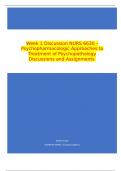
-
Week 1 Discussion Discussion: Foundational Neuroscience NURS 6630 – Psychopharmacologic Approaches to Treatment of Psychopathology Discussions and Assignments
- Exam (elaborations) • 14 pages • 2024
- Available in package deal
-
- $14.99
- + learn more
NURS 6630 – Psychopharmacologic Approaches to Treatment of Psychopathology Discussions and Assignments Week 1 Discussion Discussion: Foundational Neuroscience
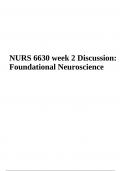
-
NURS 6630 week 2 Discussion Questions With Answers: Foundational Neuroscience
- Exam (elaborations) • 6 pages • 2023
-
- $16.49
- + learn more
NURS 6630 week 2 Discussion Questions With Answers: Foundational Neuroscience. Epigenetics focuses on alterations and modification of genes, including methylation, acetylation, phosphorylation, and ubiquitylation of DNA and histone proteins (nucleosomes), and chromatin remodeling results in disorders like cancer and degenerative diseases (Rasool et al., 2015). Rasool et al. noted that factors like nutrition and the environment cause epigenetics alteration. The authors proposed that the coll...
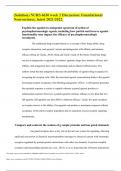
-
(Solution) NURS 6630 week 2 Discussion: Foundational Neuroscience, latest 2021/2022.
- Exam (elaborations) • 5 pages • 2024
-
- $10.49
- + learn more
(Solution) NURS 6630 week 2 Discussion: Foundational Neuroscience, latest 2021/2022. Explain the agonist-to-antagonist spectrum of action of psychopharmacologic agents, including how partial and inverse agonist functionality may impact the efficacy of psychopharmacologic treatments. The traditional drug-receptor theory is a concept of how drugs abide, drug- receptor interaction, and agonists' actions and antagonists with affinity and intrinsic efficacy (Berg, & Clarke, 2018). Berg and Cla...
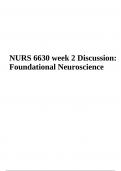
-
NURS 6630 week 2 Discussion: Foundational Neuroscience
- Exam (elaborations) • 6 pages • 2023
-
- $15.49
- + learn more
Explain the agonist-to-antagonist spectrum of action of psychopharmacologic agents, including how partial and inverse agonist functionality may impact the efficacy of psychopharmacologic treatments. The traditional drug-receptor theory is a concept of how drugs abide, drugreceptor interaction, and agonists' actions and antagonists with affinity and intrinsic efficacy (Berg, & Clarke, 2018). Berg and Clark's study of the theory found that drugs can act as antagonists or agonists. In contr...
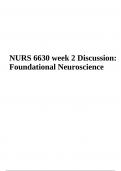
-
NURS 6630 week 2 Discussion Foundational Neuroscience | 100% Verified
- Exam (elaborations) • 6 pages • 2023
-
- $16.49
- + learn more
NURS 6630 week 2 Discussion Foundational Neuroscience | 100% Verified. Explain how the role of epigenetics may contribute to pharmacologic action. Epigenetics focuses on alterations and modification of genes, including methylation, acetylation, phosphorylation, and ubiquitylation of DNA and histone proteins (nucleosomes), and chromatin remodeling results in disorders like cancer and degenerative diseases (Rasool et al., 2015). Rasool et al. noted that factors like nutrition and the environm...
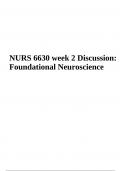
-
NURS 6630 week 2 Discussion | Foundational Neuroscience |
- Exam (elaborations) • 6 pages • 2023
-
Available in package deal
-
- $18.49
- + learn more
Epigenetics focuses on alterations and modification of genes, including methylation, acetylation, phosphorylation, and ubiquitylation of DNA and histone proteins (nucleosomes), and chromatin remodeling results in disorders like cancer and degenerative diseases (Rasool et al., 2015). Rasool et al. noted that factors like nutrition and the environment cause epigenetics alteration. The authors proposed that the collection of genome DNA information for patients at risk for disorders is vital du...
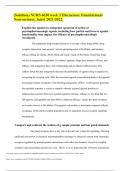
-
(Solution) NURS 6630 week 2 Discussion: Foundational Neuroscience, latest 2021/2022.
- Exam (elaborations) • 5 pages • 2024
-
- $10.89
- + learn more
(Solution) NURS 6630 week 2 Discussion: Foundational Neuroscience, latest 2021/2022. Explain the agonist-to-antagonist spectrum of action of psychopharmacologic agents, including how partial and inverse agonist functionality may impact the efficacy of psychopharmacologic treatments. The traditional drug-receptor theory is a concept of how drugs abide, drug- receptor interaction, and agonists' actions and antagonists with affinity and intrinsic efficacy (Berg, & Clarke, 2018). Berg and Cla...
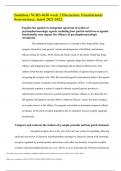
-
(Solution) NURS 6630 week 2 Discussion: Foundational Neuroscience, latest 2021/2022.
- Exam (elaborations) • 5 pages • 2023
-
- $9.49
- + learn more
(Solution) NURS 6630 week 2 Discussion: Foundational Neuroscience, latest 2021/2022. Explain the agonist-to-antagonist spectrum of action of psychopharmacologic agents, including how partial and inverse agonist functionality may impact the efficacy of psychopharmacologic treatments. The traditional drug-receptor theory is a concept of how drugs abide, drug- receptor interaction, and agonists' actions and antagonists with affinity and intrinsic efficacy (Berg, & Clarke, 2018). Berg and Cla...
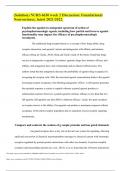
-
(Solution) NURS 6630 week 2 Discussion: Foundational Neuroscience, latest 2021/2022.
- Exam (elaborations) • 5 pages • 2023
- Available in package deal
-
- $9.49
- + learn more
(Solution) NURS 6630 week 2 Discussion: Foundational Neuroscience, latest 2021/2022. Explain the agonist-to-antagonist spectrum of action of psychopharmacologic agents, including how partial and inverse agonist functionality may impact the efficacy of psychopharmacologic treatments. The traditional drug-receptor theory is a concept of how drugs abide, drug- receptor interaction, and agonists' actions and antagonists with affinity and intrinsic efficacy (Berg, & Clarke, 2018). Berg and Cla...
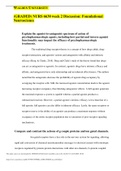
-
(GRADED) NURS 6630 week 2 Discussion: Foundational Neuroscience, latest 2022/2023.
- Other • 5 pages • 2023
-
Available in package deal
-
- $10.99
- + learn more
NURS 6630 week 2 Discussion: Foundational Neuroscience As a psychiatric nurse practitioner, it is essential for you to have a strong background in foundational neuroscience. In order to diagnose and t reat patients, you must not only understand the pathophysiology of psychiatric disorders but also how medications for these disorders impact the central nervous system. These concepts of foundational neuroscience can be challenging to understand. Therefore, this Discussion is designed to encourage ...

How did he do that? By selling his study resources on Stuvia. Try it yourself! Discover all about earning on Stuvia


